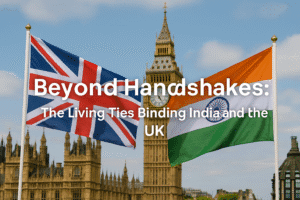Beyond Handshakes: The Living Ties Binding India and the UK
India and the UK are transforming historical ties into a 21st-century partnership anchored in real-world interdependence. Defence collaboration extends beyond joint exercises to co-producing technology like fighter jet engines, boosting India’s self-reliance. In science, a $500 million research pool targets ethical AI and climate solutions through initiatives like the Net Zero Innovation Centre. The NHS relies on over 60,000 Indian healthcare workers—a lifeline highlighting mutual need.
Education sees two-way exchange: 170,000 Indian students study in the UK while British universities establish campuses in India. The 1.8-million-strong diaspora fuels this bond, powering 65,000 businesses that generate £37 billion annually. New mobility schemes like the Young Professionals Visa further weave talent networks. Ultimately, this relationship thrives not on symbolism, but shared democratic values and tangible human connections—from NHS hospital wards to tech labs.

Beyond Handshakes: The Living Ties Binding India and the UK
Prime Minister Narendra Modi’s fourth visit to the UK isn’t just another diplomatic tour. It’s a testament to a relationship quietly transforming from colonial legacy to 21st-century partnership. While “defence, diaspora, and digital” frame the agenda, the real story lies in the tangible human and economic bridges being reinforced.
Defence: More Than Joint Exercises
The military collaboration often makes headlines for exercises like Ajeya Warrior or Tarang Shakti. But look closer:
- Shared Threats: Joint drills in the Arabian Sea aren’t symbolic. They address piracy, terror threats, and maritime security in a region critical to both nations.
- Make in India, Partner with Britain: The UK isn’t just a buyer; it’s a tech collaborator. BAE Systems’ plans to co-produce fighter jet engines in India signal a shift – from transactional deals to trusted industrial partnerships.
Digital & Science: The Unseen Backbone
The $500M joint research pool is impressive, but the real value?
- Climate Tech Bridge: The new Net Zero Innovation Centre tackles industrial decarbonization – where India’s scaling needs meet UK’s R&D strengths.
- AI Ethics & Quantum Leaps: Unlike U.S.-China tech rivalries, India-UK collaborations focus on responsible innovation. Their joint work on AI safety frameworks could set global standards.
Healthcare: A Lifeline Made Visible
The NHS statistics reveal an uncomfortable truth:
- 60,533 Indian professionals aren’t just “workers.” They’re surgeons saving lives in Liverpool, nurses comforting elders in Edinburgh. They represent 10% of all NHS doctors.
- Vaccine Trust: The AstraZeneca-Serum Institute pact wasn’t charity; it was mutual dependence. India delivered 90M+ doses to the UK during the crisis.
Diaspora: The Human Mosaic
Beyond the 1.8 million people:
- Quiet Powerbrokers: Over 65,000 diaspora-run businesses generate £37B yearly. They’re not just shop owners – they’re biotech founders (e.g., Hester Biosciences), FTSE-100 board members (e.g., Natarajan Chandrasekaran), and policy influencers.
- Cultural Currency: From “Bend It Like Beckham” to Rishi Sunak’s chai-sipping authenticity, Indianness is woven into British identity. Modi’s Wembley rally (2015) drew 60,000 – not for politics, but for shared belonging.
Education: Reverse Colonization?
- Campuses Inverted: Southampton University’s Gurugram campus flips the script. India isn’t just sending students west; it’s importing pedagogy while exporting talent.
- The Young Pros Scheme: The 3,000 visas aren’t charity. They’re talent arbitrage – UK startups gain hungry Indian engineers; India reclaims upskilled innovators.
Why This Visit Truly Matters
This trip isn’t about signing MOUs. It’s about:
✅ Leveraging Interdependence: The UK needs skilled workers and growth markets; India needs tech and investment.
✅ Soft Power Alignment: Democratic values vs. authoritarian models (China).
✅ Diaspora as Ambassadors: They humanize policy – making “Global Britain” and “New India” tangible.
As Modi and Sunak share chai (or a pint?), they’re stewards of a partnership where history’s shadows fade before shared futures. The real headline? Two nations building a 21st-century alliance – one nurse, startup, and satellite at a time.
You must be logged in to post a comment.